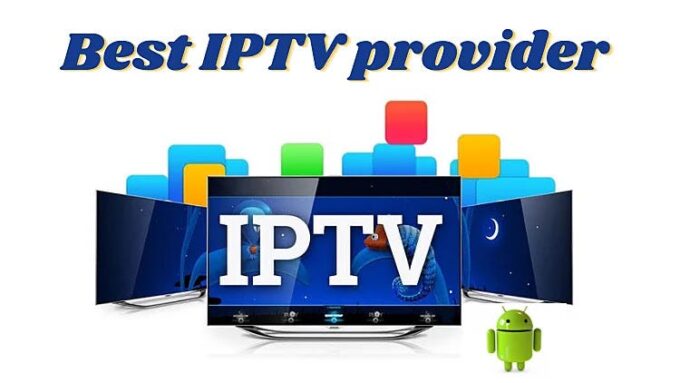In the rapidly evolving world of digital entertainment, IPTV (Internet Protocol Television) has emerged as a revolutionary technology, offering a myriad of television services through Internet protocols. Unlike traditional television formats, IPTV allows users to stream content through their internet connections, offering a more interactive and personalized viewing experience. With the increasing demand for IPTV services, selecting the right IPTV system has become crucial for both individual users and businesses. This article delves into the essential aspects of choosing the perfect IPTV solution, ensuring an informed decision that meets your specific needs and preferences.
Understanding IPTV and Its Benefits

Source: medium.com
Before embarking on the journey to select the best IPTV system, it is imperative to understand what IPTV is and the advantages it brings to the table. IPTV is a system where television services are delivered over the internet instead of through traditional terrestrial, satellite, and cable television formats. This innovative approach offers several benefits, including on-demand content, live broadcasts, interactive features, and the ability to watch content on various devices, from TVs to smartphones.
The flexibility and convenience of IPTV have made it an attractive option for many, providing access to a vast array of content, including international channels and niche programming, that traditional TV services might not offer.
Assessing Your Requirements
The first step in choosing an IPTV system is to assess your needs and requirements. Are you looking for a solution for personal use, or do you need an IPTV system for a commercial setting, such as a hotel or educational institution? The scale of your requirements will significantly influence your choice, as commercial systems often require more sophisticated features such as content management systems, integration capabilities, and higher levels of security.
For personal use, factors such as the variety of channels, video on demand (VOD) library size, user interface, and device compatibility should be considered. It’s also essential to evaluate the quality of service, including buffer times and video quality, to ensure a seamless viewing experience.
Exploring IPTV Service Providers
Once you have a clear understanding of your requirements, the next step is to explore various IPTV service providers. The market is flooded with numerous options, each offering a unique set of channels, features, and pricing models. Conducting thorough research is crucial to identify providers that align with your preferences and budget.
When evaluating providers, consider the following:
- Content Offering: Does the provider offer the channels and content types you’re interested in? Make sure to check for the availability of your preferred genres, such as sports, movies, or international content.
- Quality of Service: Look for reviews or ask for trials to test the streaming quality, including resolution, buffering times, and reliability during different times of the day.
- Compatibility: Ensure the IPTV service is compatible with your existing devices, such as smart TVs, smartphones, and streaming devices. Also, consider the ease of installation and setup.
- Customer Support: Reliable customer support is crucial, especially for IPTV services, where technical issues can arise. Check the availability and responsiveness of the provider’s support team.
Considering the Technical Aspects

Source: medium.com
Delving into the technicalities of IPTV systems is vital to make an informed decision. Key technical aspects include:
- Content Delivery Network (CDN): A robust CDN is essential for a seamless streaming experience, ensuring that content is delivered efficiently and with minimal delays.
- User Interface (UI): The UI should be intuitive and user-friendly, allowing easy navigation and access to content.
- Security: With the increasing concerns about digital security, it’s important to choose an IPTV system that offers robust protection measures, including secure content delivery and user data protection.
Evaluating Cost Implications
The cost of IPTV systems can vary widely, depending on the features, content, and service quality. It’s important to evaluate the pricing models of different providers, considering both the initial setup costs and ongoing subscription fees. For commercial users, the return on investment (ROI) should also be considered, ensuring that the IPTV system adds value to the business or service offering.
Future-Proofing Your IPTV Solution
In the fast-paced world of technology, choosing an IPTV system that can adapt to future advancements is crucial. Consider systems that offer regular updates, support for new formats and standards, and scalability to accommodate growing user bases or content libraries.
Making the Final Decision

Source: e-makan.com
After thorough research and consideration, it’s time to make your final decision. Compile a shortlist of IPTV systems that meet your criteria and compare them side by side. Don’t hesitate to reach out to providers for more information or request demos to see the systems in action.
Remember, the best IPTV system for you is one that balances content offerings, technical features, cost, and future-proofing, aligning with your specific needs and preferences.
Navigating Legal and Regulatory Considerations
When selecting an IPTV system, it’s crucial to navigate the legal and regulatory landscape surrounding digital content distribution. Different countries have varying regulations regarding the broadcasting and streaming of content over the internet. Ensuring that your chosen IPTV provider complies with these regulations is essential to avoid potential legal issues. This includes adherence to copyright laws, content licensing agreements, and any specific regional broadcasting restrictions. Understanding these legal nuances can protect you from unintentional violations and ensure that your IPTV experience remains uninterrupted and compliant.
Prioritizing User Experience and Accessibility
The overall user experience and accessibility of the IPTV system are pivotal factors that can significantly influence satisfaction and usability. This encompasses the ease of navigating the interface, the quality of search functionalities, and the availability of accessibility features such as subtitles, language options, and audio descriptions for the visually impaired. An IPTV system that prioritizes a positive user experience and broad accessibility will cater to a wider audience and ensure that all users, regardless of their technical proficiency or physical abilities, can enjoy the content to its fullest.
Closing Thoughts

Choosing the right IPTV system involves a comprehensive approach that extends beyond merely comparing content offerings and technical features. It requires an understanding of your specific needs, a thorough evaluation of potential providers, and an awareness of the legal and regulatory landscape. Additionally, prioritizing the user experience and accessibility ensures that the chosen system is inclusive and enjoyable for all audiences. By considering these factors, alongside the previously discussed aspects of content, technical capabilities, cost, and future-proofing, you can make an informed decision that enhances your digital entertainment experience. Embrace the dynamic world of IPTV with a solution that not only meets your current demands but is also poised to adapt to future advancements, ensuring long-term satisfaction and compliance in the ever-evolving digital content landscape.







